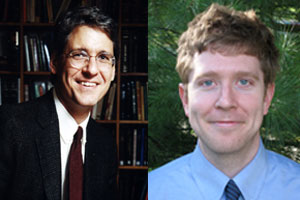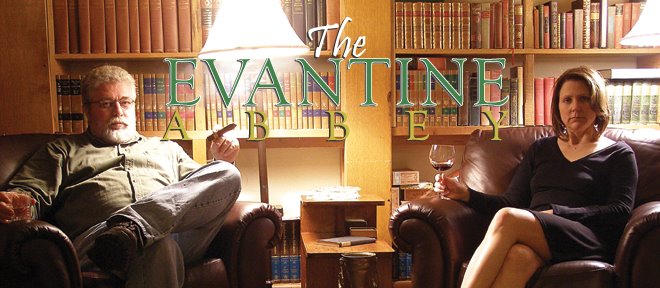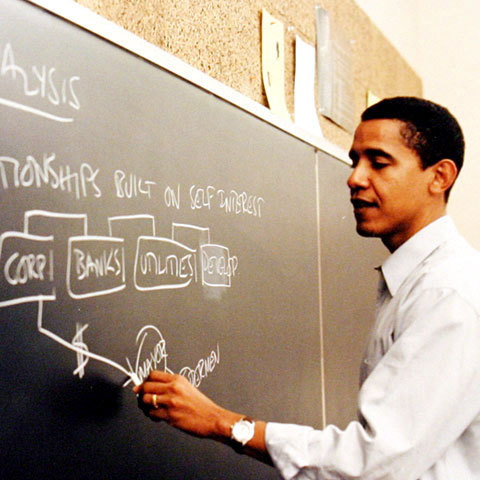5.1 Tarwater, The Schoolteacher, & The Unconscious Mind
 “Children may be attracted to mad eyes. A grown person could have resisted. A child couldn’t. Children are cursed with believing.”
“Children may be attracted to mad eyes. A grown person could have resisted. A child couldn’t. Children are cursed with believing.”
The boy recognized the sentence. “Some ain’t” he said.
The schoolteacher smiled thinly. “And some who think they aren’t are,” he said, feeling that he was back in control. “It’s not easy as you think to throw it off. Do you know,” he said, “that there’s a part of your mind that works all the time, that you’re not aware of yourself. Things go on in it. All sorts of things you don’t know about.”
Tarwater looked around him as if he were vainly searching for a way to get out of the boat and walk off.
“I think you are basically very bright,” his uncle said. “I think you can understand the things that are said to you.”
“I never came for no school lesson,” the boy said rudely. “I come to fish. I ain’t worried what my underhead is doing. I know what I think when I do it and when I get ready to do it, I don’t talk no words. I do it.” (Flannery O’Conner, ‘The Violent Bear It Away’ in Collected Works, 1988, 436)
5.2 Introduction
In Part 2, I allowed Daniel Dennett to frame the spirit of the New Enlightenment, and I contrasted this frame with the continued naive cynicism of Greg Mitchell, which is representative of the backlash within legal theory to the widening terrain of the mind sciences (Mitchell in press; see Part1, section 3.2.2. For a good example of the widening of terrain, see The Situationist’s new post Law Students Flock to Situationism). In what follows, I give room to the emphasis of Christopher Hitchens, which will provide me opportunity to expand the notion of a genuine interdisciplinary method. Just such a method, I will argue, is necessary to mitigate the scientism latent in any new scientific advance, in particular, the advance of the mind sciences. I do this in part by expanding the structure of traditional anti-scientism arguments within philosophy of Mind; I add substance to the philosophical point by drawing on provocative narratives by C.S. Lewis and Flannery O’Conner. This will, I hope, provide a way to diminish the tension between the growing explanatory province of the mind sciences and the natural backlash this incurs.
6.1 Hitchens’ Humanism
My focus on Hitchens in what follows is timely, although coincidental. The media spike over Hitchens to-do with my spiritual father - a north Idaho prophet, known to some as Dear Leader Douglas Wilson – is getting ready to reach what should be its zenith. This is good news, since it means more marketing of Hitchens’ book, god is not Great (2007). Those of you new to this subject might not know of the events a few years ago when I went from loyal apologist for the Kirk, Wilson’s engineered community, to ridiculed outcaste. During this process, Wilson became my object of investigative journalism and specimen for informal social psychology research. This approach transformed sobering tragedy to a suffering into a good deal of truth – for myself and also for many of the readers of Pooh’s Think, Part 1. I am writing a book about this titled The Kirk: Mother of War.
After writing the rough draft of this entry, I received news that the Collision ‘movie’ or ‘documentary’ of Hitchens’ and Wilsons’ three day tour will be premiered in New York City on the 28th, with Hitchens and Wilson in attendance, and in L.A. on the 29th. Aaron Rench, one of my old Kirk ‘friends’ is the ‘producer’. (Many words require quotation marks, given the Kirk’s somewhat turn-key and nepotistic approach to saving civilization). You can read a recent exchange between Hitchens and Wilson at the Huffington Post’s web site. Hitchens and Wilson will be making appearances this Friday, 10/23 10am ET, live on the Laura Ingraham show (oops, this just took place as I go over my final edit); Sunday 10/25, on NPR “All Things Considered” Weekend Edition; and Monday 10/26, on the 7am hour on Fox News’ “Fox And Friends”.
I have already offered some analysis of Hitchens and Wilsons’ original ‘published’ ‘debate’ (again, quotation marks prove helpful); you can find my summary of that ‘debate’ here and what I consider my primary analysis entry here . Timeliness turned to a bit of irony last night, after my wife brought home a random DVD selection from the library titled the Trials of Henry Kissinger; in the early days of dissent, I and some others dreamed about the Trials of Douglas Wilson, and at one point I began a fictional narrative of the trial. Christopher Hitchens is qualitatively the primary interviewee in this documentary on Kissinger, which appears to be based on Hitchens’ book The Trial of Henry Kissinger. This is a helpfully sobering documentary, by the way, and I highly recommend it.
With that said, I return to the subject of mind science and the New Enlightenment. Hitchens concludes god is not Great (2007):
Above all, we are in need of a renewed Enlightenment, which will base itself on the proposition that the proper study of mankind is man, and woman. This Enlightenment will not need to depend, like its predecessors, on the heroic breakthroughs of a few gifted and exceptionally courageous people. It is within the compass of the average person. The study of literature and poetry, both for its own sake and for the eternal ethical questions with which it deals, can now easily depose the scrutiny of sacred texts that have been found to be corrupt and confected. The pursuit of unfettered scientific inquiry, and the availability of new findings to masses of people by easy electronic means, will revolutionize our concepts of research and development. Very importantly, the divorce between the sexual life and fear, and the sexual life and disease, and the sexual life and tyranny, can now at last be attempted, on the sole condition that we banish all religions from the discourse. All this and more is, for the first time in our history, within the reach if not the grasp of everyone.
Extrapolating from Hitchens’ emphasis here, I submit that science does not gain automatic entry into this renewed or, according to Lakoff, New, Enlightenment (2008). Scientism, pinhead researchers, and political authoritarianism within scientific institutions do not get a free ride, of course, but even scientific fact, as such, can be held suspect in certain contexts. It is worth noting that in this quote from Hitchens, science comes last, after literature and poetry. As seen in Part 2, science captures the spirit of the new enlightenment in virtue of the humility, checks and balances, and freedom of inquiry latent within scientific practice, but there is more to be said; context has the power to critically shape to the meaning of any given scientific ‘fact’. My preliminary description of the New Enlightenment, in Part 1 , was intended to capture this point: “a progressive, interdisciplinary demeanor that weds the emerging mind sciences, meta-critical philosophy, the arts, and the work of the public intellectual.” Here, the mind sciences do not receive privileged weight.
6.2 Interdisciplinary Method & Being Human
By ‘interdisciplinary,’ I reference a demeanor that covers cosmopolitan trans-human experience and concern. The New Enlightenment is a renewed humanism, the study of man, and woman. Our human nature is repulsed by any hard, premature reduction since being human entails its denial – emotionally and intellectually. We all know to some degree what it is like to be human, and as Hitchens pronounced, literature and the advance of science is now in the reach of everyone. In reach is not membership in an elite band of literati within the hallways of Oxford and Cambridge – poised with status and wealth as much as, or more than, intellect, curiosity, and passion. The New Enlightenment is rather a demotic literati of noble intellect. A farmer in Oregon and a house painter in Kansas, connected through local culture, mentors, and access to the internet, are often better poised as future literati than the average frat boy enjoying the first two years of parent-paid college (although I remain an elitist with respect to graduate focused work at top-ranked research institutions). Something could be said even for the extreme contrast to academia; one of the most important mentors I have had (a Stanford PhD) expressed to me the noteworthy experience of teaching classes to convicts while on leave. The students of this kind of classroom had a deep ‘appreciation’ for the topics discussed; to understate the case: they took far less for granted than the average American college student.
6.3 The Noble Intellect
The noble intellect, at some sort of minimum, understands its need for ecumenical discussion, discipline, and tutelage, while also refusing to turn the cheek to vain authoritarianism – in the home, in the government, in the workplace, in the school, in the scientific establishment, in the media, in any social context where mechanisms of control are naturally operative; the noble intellect says with humble finality, ‘they will not tread on me.’ Truth and liberty, and their cultural descendents, are too precious. The free intellect is, as those who possess it know intimately, self-justifying (see Hitchens’ Letters to a Young Contrarian, 2001, and the curious discussion that arose in the comment section of my entry regarding this book).
When I think of a noble intellect, as apposed to, say, a noble savage, I do not yet have anything worthy of conventional definition. I envision, roughly, an imagination best captured by the phrases, taken only in their combined unity: Cosmopolitan Society, Justice, Peace, Mercy, Dignity, Human Flourishing, Liberty, Freedom, Freedom of Inquiry, Freedom of Speech, Inquisitiveness, Nurture, Love, Family, Love of Children, Village, Culture, Mitigation of Suffering, Sensitivity to Ecology, Love of Nature, Discipline, Frugality, Hard Work, Humility, Checks and Balances of Necessary Power, Love of Beauty, Art, Realism, Passion, and Compassion.
6.4 Scientism, what-it-is-like-to-be, & what it is to be Human
Scientific fact qua fact (or diagram, chart, equation, 3-D model, image, or simulation) is subservient to the noble intellect and the humanism entailed by genuine interdisciplinary inquiry. What it is to be human trumps scientific fact. But I must contrast what it is to be human with the close and also important conception of what it is like to be human. The latter has been conceived by philosophers – Thomas Nagel, for example – to be a cross-modal phenomenal unity as well as a phenomenal unity through time. However, the imagination of philosophers, as it is, has often relegated this intuition to some sort of Cartesian Theatre (Dennett, 1991). So I will here attempt a more accurate picture:
1) What it is like to be human is not what it is like for Sally to simply be Sally. Nor is it what it is like for Sally to engage in some generalized activity: What it is like for Sally to see Paris by Moonlight (although Dennett dissents, 2007), or more abstractly: What it is like for S to V. For a correct statement of this point, albeit with a wrong application and conclusion, see P.M.S. Hacker’s ‘Is There Anything it is Like to be a Bat?’ (Philosophy 77, 2002.). Rather, what it is like to be human is a generalization from the concrete and the specific. In this case, the concrete and specific is what it is like for Sally to be Sally at time t.
2) Time slices do not really exist, though, and so ‘time t‘ in reality references a time sequence, or, a unity through time. This is at least true in some sense. Traditional philosophy has not been quick to perceive any illusions that can spring from reconstructing our own awareness, or consciousness. We do after all seem to have a continuous, singular stream of consciousness, which in turn appears to be structured according to coherent frames and narratives. Yet, the mind sciences are revealing anything but such a simple and intuitive picture. So only roughly and tentatively, I reference a unity through time in order get past timeless slices of experience – given their non-existence.
3) Most importantly, the traditional ‘Hard Problem’ of philosophy of Mind can be expanded to the larger interdisciplinary project of the New Enlightenment. The Hard Problem has conventionally pertained to whether or not qualia ghosts exist (the sort of ontology that comprises consciousness, what it is like to be), and if so, whether or not these ontological items may be somehow thoroughly explained through scientific practice. I submit that this is not the Hard Problem – more ideally construed – but only one confused part of the Hard Problem. The Hard Problem is larger than this; the Hard Problem is conceiving of a mind science that successfully encompasses all there is to encompass, including, for example, the cognitive mechanisms responsible for the scientific imagination of the cosmologist.
6.5 What Mary Didn’t Know
This brings me to the structure of an old argumentative tradition in Philosophy of Mind. Although Nicholas Maxwell (1966, 2000) might have been the first to tell the story about a girl named Mary, the story’s classical expression, known also as the “knowledge argument,” was given by Frank Jackson in his essay ‘What Mary Didn’t Know’ (1986). The context was, roughly, the war between physicalism and metaphysical dualism, and a concern over ‘scientism’ often protruded itself. Mary, a scientific goddess-like little girl, grew up in a black and white laboratory and happened to know all the physical facts about the universe there were to know. If Mary, once finally leaving her black and white environment, did in fact learn a new fact upon seeing red for the first time (a fact related to what it was like to see a certain shade of red, for instance), then there must be a class of facts that are “non-physical” – a conclusion that for some philosophers had momentous metaphysical import.
According to Frank Jackson, “What she knows beforehand is … everything physical there is to know, but is it everything there is to know? That is the crucial question.” David Chalmers’ intuition ten years later is similar, but a bit stronger: “If a materialist is to hold on to materialism, she really needs to deny that Mary makes any discovery about the world at all” (1996; my emphasis). (Dennett’s more recent discussion about Mary’s surprise [2007] is a bit too X-rated for my purposes here.) Somewhat similarly, Thomas Nagel famously argued in ‘What It is Like to be a Bat’ (1974) that there seems to always be some sort of discovery – at least in principle – with a change in a subjective point view.
This argument can be expanded, so it seems to me, within a more interdisciplinary context. However, I have traditionally criticized how this argument has been played out. Nagel assumed the existence of facts that were beyond the human conceptual system, likening facts to numbers – an idea no less bizarre than countless other platonic ideas philosophers have proposed. Thus, materialism was somehow intractable given the existence of facts about, for instance, what it is like to be a bat, which are beyond the ability of a human conceptual system to know. But, as I have noted for the last decade, propositions do not exist, and without the context of human linguistic practice, a ‘fact’ is nonsensical. Yet, Jackson likewise dismissed Paul Churchland’s criticism by claiming that the only metaphysical point of interest was whether or not Mary came to know a new fact upon seeing red. Gained ability, experiential knowledge, or surprise was beside the point. Chalmers’ approach differed slightly from this, and I think he states the problem most satisfactorily. Again, “If a materialist is to hold on to materialism, she really needs to deny that Mary makes any discovery about the world at all.” Jackson’s statement remains apt and complimentary: “. . . but is it everything there is to know? That is the crucial question.” But the word ‘know’ here is unfortunate; it has led to disputes over whether this knowledge encompasses abilities in addition to knowledge of fact, while leaving, to my continued astonishment, the knowledge of what it is like to be entirely alone.
I therefore prefer to leave explicit reference to phenomenology and knowledge out of my expanded formulation: the Hard Problem is conceiving of a mind science that successfully encompasses all there is to encompass. If we are going to discover a solution to this one confused part of the Hard Problem – the problem over the existence and metaphysical/scientific status of qualia (or phenomenal concepts, or higher orders of representations, or the like) – it will from here take all the resources of the mind sciences within the interdisciplinary context of the New Enlightenment.
But, given this expanded context, there is a good deal more to encompass than the qualia of consciousness. There is unity that we find between brain and mind, mind and body, body and the full embrace of a fine-tuned environment. Further, many of our artifacts are in a sense extensions of our mind (Dennett, 1995). This fine-tuned, delicately balanced environment is the warm cradle in which our minds have been fashioned: above water and roughly above sea level, close to the equator (at least, without technological life support systems that have come lately, such as a fur jacket). Our own individual experience of place is a microcosm of the dependency of one kind of life on another and of our dependence on a larger social world, typically involving other humans (but at times relying on slightly lower level intentional organisms, such as fish, lizards, gerbils, cats, monkeys, and closest to the human heart, the domesticated canine). In sum, the brain would be almost powerless – meaningless even – without the body. The brain and the body comprise an organic whole; there is no clear line to be drawn between the two. Further, there would be no mind as we know it unless is was an embodied mind; and there would be no embodied mind as we know it without a world in which embodiment took place.
The Anglo philosopher might not be content with such a move: No sense in snooping around in the dark alleyway after we have located such a precise formulation of the Hard Problem right under the lamp post. I have two tentative, preliminary responses to this just concern:
1) There seems to be universal agreement among philosophers of Mind (for example, the nonreductivist John Searle, 1991) that further scientific discovery will provide explanations for how consciousness arises. Neurons do it, for sure, we just do not have a clue how. There seems to be agreement that neurobiological advance will surely provide significant constraints on what there will then be to discover, which I contribute to the power of scientific discovery to change our conceptions of what we are and how we relate to the world around us. However, lower level mechanisms will not thereby provide the final field of study of all there is to discover.
2) Further, what we have seen so far in the mind sciences is a significant blurring of any line we conceive between consciousness and unconsciousness. The embodied, conceptual metaphor often employed is Consciousness is Space Above, where consciousness is above and unconsciousness is below a horizontal line, such as the boundary between ocean and sky, or between what is above or under a car hood. But the mind sciences continue to fuzz this line. This helpful conceptual metaphor may end up little more than a passing, temporarily helpful, illusion. We mistake sophisticated unconscious mechanisms for special access to qualia, and we mistake simulations of reconstructed episodic memory for the products of original, stable unconscious ‘perception’. My theory is that much of our ‘intentionality’ is not the product of conscious intention at all, but rather a product of more primitive, albeit more sophisticated, forms of unconscious intentionality (integrating metaphor theory with Dennett’s Intentional Stance, 1995).
3) There is therefore no clear boundary between unconsciously produced language and discursive thought, between the imagination and unconscious narrative scripts and frames, between the searching for the right word and the creative on-line construction that right word cues (Seana Coulson, Semantic Leaps, Cambridge, 2001), between knowledge of what it is like to be human and knowledge of what it is to be human, and between our knowledge of what it is to be human and our timeless literary traditions. We are all anthropologists never really knowing if what we have derived came from inside or from without.
7.1 Lions, Brains & Neurons, Oh My!
In consideration of this, I am not shy to wonder out loud if the new rave about ‘brains’ and pictures of ‘neurons’ is just not quite right, and perhaps, even to a degree pathological at times. Jurassic Park comes to mind here, as a parable, if not a sound philosophy of science illustration. Recall the disdain the paleontologist had for the arrogant boy that did not find old fossils of much interest, and the resulting scary lesson involving a raptor claw. Even better, consider the aesthetic, sensual scripts implicit in the paleontologist’s conceptual tools while digging for dinosaur fossils, revealed explicitly the moment the park’s new visitors come face to face with bones enfleshed. It was the awe of the scientist and not the naive observer that brought them to their knees upon seeing the real thing. The wonder and shock was in part noticing the fine grained differences between the real dinosaurs and contemporary scientific imagination. I found a main web site for Jurassic Park, and sure enough, the main page begins automatically playing the precise footage I have in mind here.
The brain sciences work in reverse; in many respects we have the wonder of the human experience already captured within our local purview, and less mundanely, in the experience recorded in our literature. Locating neuronal networks, and even, higher level cognitive mechanisms, and saying “here it is, this just is the human life” would be to commit the reductionist fallacy – regardless of how many folk illusions are uprooted in the process. But this is the natural ‘pull’ of the scientist, resulting in the natural, intuitive fear responsible for the backlash. At once, our freedom, our transcendence, our morality – the beauty and awe inspiring world of the imagination, all our cherished humanity – all this vanishes, leaving us locked within an ugly, meaningless, deterministic prison. Wilson, lacking any form of sophisticated argument or noble, compassionate sentiment (as coyly noted by Molly Worthen, and less coyly by Hitchens [Canon Press, 2008]), resorts to an incessant play on this natural fear. This is in fact the primary thrust of Wilson’s response to Hitchens in the recent Huffington Post exchange I linked to above (6.1):
The atheistic worldview is nothing if not inherently reductionistic, whether this is admitted or not. Everything that happens is a chance-driven rattle-jattle jumble in the great concourse of atoms that we call time . . . if the universe is what the atheist maintains it is, then this determines what sort of account we must give for the nature of everything — and this includes the atheist’s thought processes, ethical convictions, and aesthetic appreciations. If you were to shake up two bottles of pop and place them on a table to fizz over, you could not fill up an auditorium with people who came to watch them debate. This is because they are not debating; they are just fizzing . . . Nor does atheism allow us to have any fixed ethical standard, or the possibility of beauty.
7.2 C.S. Lewis & Flannery O’Conner
C.S. Lewis and Flannery O’Conner, both Christian theists, make no such crude claims, in part because they wished distance themselves from the cussed fundamentalism that Wilson has been rhetorically committed to his entire life. (Although there are different attitudes in Christendom about this sort of distinction, as seen in the different stances taken on the idea of ‘fundamentalism’ by N.T. Wright [Fortress Press, 1992] and Alvin Plantinga [Oxford, 2000]). In fact, the story I have drawn from by Flannery O’Conner (cited at the beginning of this entry and more exhaustively in what follows) captures all transcendence within an immediate psychological interpretation; throughout the story, there needs be no assumption on the part of the reader, or even within the denouement of each remaining character’s life, that theism be true or false.
7.3 The Gaze of the Giant
In The Pilgrim’s Regress, C.S. Lewis captures both the fear and the feeling of confinement, determinism, and even imprisonment that most have towards a prematurely reductionist assessment of the human experience. The following is the entirety of the short section called ‘Facing the Facts’:
John Lay in his fetters all night in the cold and stench of the dungeon. And when morning came there was a little light at the grating, and looking around, John saw that he had many fellow prisoners, of all sexes and ages. But instead of speaking to him, they all huddled away from the light and drew as far back into the pit, away from the grating, as they could. But John thought that if he could breathe a little fresh air he would be better, and he crawled up to the grating. But as soon as he looked out and saw the giant, it crushed the heart out of him: and even as he looked, the giant began to open his eyes and John, without knowing why he did it, shrank from the grating. Now I dreamed that the giant’s eyes had this property, that whatever they looked on became transparent. Consequently, when John looked round into the dungeon, he retreated from his fellow prisoners in terror, for the place seemed to be thronged with demons. A woman was seated near him, but he did not know it was a woman, because, through the face, he saw the skull and through that the brains and the passages of the nose, and the larynx, and the saliva moving in the glands and the blood in the veins: and lower down the lungs panting like sponges, and the liver, and the intestines like a coil of snakes. And when he averted his eyes from her they fell on an old man, and this was worse for the old man had cancer. And when John sat down and drooped his head, not to see the horrors, he saw only the working of his own inwards. Then I dreamed of all these creatures living in that hole under the giant’s eye for many days and nights. And John looked round on it all and suddenly he fell on his face and thrust his hands into his eyes and cried out, ‘It is the black hole. There may be no Landlord, but it is true about the black hole. I am made. I am dead. I am in hell for ever.’
I see no reason not to draw the same conclusions about some contemporary talk of ‘the brain’ and the significance of the ‘neuron’ – although touting just this for a neuro-science program seems perfectly natural! The most basic cognitive abilities we share, such as somehow seeing a seagull as a seagull or unconsciously recognizing a word, are higher-level mechanisms realized by efficient parallel processing among hundreds of thousands of neurons and billions of connections among them (for some excellent recent scholarship on mechanism, see William Bechtel [UCSD] generally, and specifically: Bechtel and Abrahamsen, ‘Dynamic Mechanistic Explanation: Computational Modeling of Circadian Rhythms as an Exemplar for Cognitive Science’, to appear in Studies in History and Philosophy of Science Part A). Further, these mechanisms are embodied, and the seagull or a semantic item is part of our fine-tuned environment in which and for which our mind was designed. I attempted to describe my experience of a seagull not too long ago on Eric Schwitzgebel’s blog, the Splintered Mind :
I recall my intense gaze on Saturday, when I was tempting a seagull to get 18 inches away from me with some treats. The social context was implicit and certainly not fully unconscious. . . .I must have had some kind of conscious employment of sensory-motor simulation, since I could perceive the softness of the feathers around the entire seagull-object. I watched the seagull turn its head back and forth, apparently more concerned about what was going on all around more than with me. I could therefore in some sense consciously grasp the seagull’s motions through my own embodied emulation mechanisms. Further, this perception must have involved a conscious aspect of the mapping of this embodied emulation to a “survey” view, since part of the emulation was an immediate awareness of seagull’s 360 degree tracking of the environment.
Explaining such a common, basic event in human experience will be informed more and more by the neurosciences, but there will remain an unbridgeable chasm in our scientific imagination between basic level neuronal mechanisms and the higher level mechanisms of perception and simulation they realize – and even more so with respect to the interplay between the conscious and unconscious mind during perception. Patricia Churchland explains “network-level research” as intended to bridge the gap between “coherent global, system-level change” and the level of neurons (‘How do neurons know? Daedalus Winter, 2004). But such an explanatory bridge will not remove the need for an imaginative toggle between lower level and extensively higher level mechanisms. The natural fear produced by some hard reductionist symbols and suggestions, is that this lower-level explanation will become the new, authoritative eyes of the scientific imagination, now looking down upon us in our new dungeon, admitting to meaningful experience only the inner workings of our brains. But this is not a consequence of the progression of the mind sciences so long as they are kept within a broader, humanist, and more realistic interdisciplinary methodology – the methodology of the New Enlightenment.
7.4 Fear & Backlash
So it is with the natural backlash (see Part 2) explored by Adam Benforado and Jon Hanson in “Naive Cynicism: Maintaining False Perceptions in Policy Debates” (57 Emory Law Journal 499, 2008). Human experience will remain to a degree ‘free’ and transcendent regardless of what we discover about the intentional nature and sophistication of the unconscious mind – which, recall, was perfectly ambiguous in Gregory Mitchell’s recent expression of backlash. This is because the change in our conceptions of ourselves and how this change effects our life experience is limited. The fear of determinism here is little different from the theist’s fear of losing meaning and morality upon losing belief in God. Such a conceptual and emotional transition certainly removes thick layers of meaning, which can be frightening at first, and does have consequences for human morality (I speak in part from first person experience). But it does not remove meaning altogether and in fact permits greater conceptual and emotional – not to separate the two – access to just what robust, genuine morality is: empathy rather than obedience. But the fervor of scientism is fairly careless about these kinds of cultural distinctions and can produce a good deal of repulsion from the common man – perhaps on occasion with sinister intent.
7.5 Flannery O’Conner & the Fear of The Unconscious
In one of her two longer stories, ‘The Violent Bear It Away’ (Collected Works, 1988), O’Conner gives a compelling view of the psychology of a determined and fearful old man and his two nephews: Tarwater, a naive and confused boy and the schoolteacher, a reductionist. Both the old man and the boy are afraid to ‘become’ scientific data within the schoolteacher’s head; they both desperately seek their freedom, freedom to act, as the gaze of Lewis’ giant threatened to reveal the powerful workings of their unconscious mind. The third paragraph into the story begins:
The old man was in a position to know what his ideas were. He had lived for three months in the nephew’s house on what he had thought at the time was Charity but what he said he had found out was not Charity or anything like it. All the time he had lived there the nephew had secretly been making a study of him. The nephew, who had taken him in under the name of Charity, had at the same time been creeping into his soul by the back door, asking him questions that meant more than one thing, planting traps around the house and watching him fall into them, and finally coming up with a written study of him for a schoolteacher magazine. The stench of his behaviour had reached heaven and the Lord Himself had rescued the old man. He had sent him a rage of vision, had told him to fly with the orphan boy to the farthest part of the backwoods and raise him up to justify his Redemption. (331)
Now alone in a shack surrounded by a corn field miles from a regularly traveled path, the old man, a self-appointed prophet, lectures Tarwater, the boy he stole from the schoolteacher’s house:
”I saved you to be free, your own self!” he had shouted, “and not a piece of information inside his head! If you were living with him, you’d be information right now, you’d be inside his head, and what’s furthermore,” he said, “you’d be going to school.” (339)
This appears to be the sturdiest thread throughout the story, and comes back again and again:
. . . indistinguishable from the herd, and in the schoolteacher’s head, he would be laid out in parts and numbers. “That’s where he wanted me,” the old man said, “and he thought once he had me in that schoolteacher magazine, I would be as good as in his head.”
The schoolteacher’s house had had little in it but books and papers. The old man had not known when he went there to live that every living thing that passed through the nephew’s eyes into his head was turned by his brain into a book or a paper or a chart. The schoolteacher had appeared to have great interest in his being a prophet, chosen by the Lord, and had asked numerous questions, the answers to which he had sometimes scratched down on a pad, his little eyes lighting every now and then as if in some discovery.
The old man had fancied he was making progress in convincing the nephew again of his Redemption, for he at least listened though he did not say he believed [Note that Dennett's Heterophenomenology is free of such hypocricy, 1991]. He seemed to delight to talk about the things that interested his uncle. He questioned him at length about his early life, which old Tarwater had practically forgotten. The old man had thought this interest in his forebears would bear fruit, but what it bore, what it bore, stench and shame, were dead words. What it bore was a dry and seedless fruit, incapable even of rotting, dead from the beginning. From time to time, the old man would spit out of his mouth, like gobbets of poison, some of the idiotic sentences from the schoolteacher’s piece. Wrath had burned them on his memory, word for word.
“His fixation of being called by the Lord had its origin in insecurity. He needed the assurance of a call, and so he called himself.” “Called myself!” the old man would hiss, “called myself!” (341)
. . . “Where he wanted me was inside that schoolteacher magazine. He thought once he got me in there, I’d be as good as inside his head and done for and that would be that, that would be the end of it. Well, that wasn’t the end of it! Here I sit. And there you sit. In freedom. Not inside anybody’s head!” (342).
After the old man died, a stranger, who knew of these events, explained to Tarwater:
[The old man] favored a lot of foolishness, the stranger said. The truth is he was childish. Why, that schoolteacher never did him any harm. You take, all he did was to watch him and write down what he seen and heard and put it in a paper schoolteachers to read. Now what was wrong in that? Why nothing. Who cares what the schoolteacher reads? And the old fool acted like he had been killed in his very soul. (345)
Going back in time – as is O’Conner’s habit – we are given a scene in which the old man lectures a lawyer in the city:
”Listen, ” his uncle said, “all the time he was studying me for this paper. Taking secret tests on me, his own kin, and crawling into my soul through the back door and then says to me, ‘Uncle, you’re a type that’s almost extinct!’ Almost extinct!” the old man piped, barely able to force a thread of sound from his throat. “You see how extinct I am!” (348)
In later confrontation with the schoolteacher, now posed with the Problem of Evil:
”Yours not to ask!” the old man shouted. “Yours not to question the mind of the Lord God Almighty. Yours not to grind the Lord into your head and spit out a number!” (351)
O’Conner now takes us back in time when the old man originally read the article in the schoolteacher magazine, finally realizing he was reading about himself:
For the length of a minute, he could not move. He felt he was tied hand and foot inside the schoolteacher’s head, a space as bare and neat as the cell in the asylum, and was shrinking, drying up to fit it. His eyeballs swerved from side to side as if he were pinned in a strait jacket again. Jonah, Ezekiel, Daniel, he was at that moment all of them – swallowed, the lowered, the enclosed.
And so, the old man explains to Tarwater back at their cornfield,
. . . “It was me who could act,” the old man said, “not him. He could never take action. He could only get everything inside his head and grind it to nothing. But I acted. And because I acted, you sit here in freedom, you sit here a rich man, knowing the Truth, in the freedom of the Lord Jesus Christ.”
After the old man was dead, Tarwater was united with the schoolteacher. The schoolteacher received Tarwater as would any inspired scientist:
”Now you belong to someone who can help you and understand you.” His eyes were alight with pleasure. “It’s not too late for me to make a man of you!”
The boy’s face darkened. His expression hardened until it was a fortress wall to keep his thoughts from being exposed; but the schoolteacher did not notice any change. He gazed through the actual insignificant boy before him to an image of him that he held fully developed in his mind. (388)
A good deal later, the schoolteacher attempts to educated Tarwater about the mechanisms of the unconscious mind, bring us back to the citation at the beginning of this entry:
“Children may be attracted to mad eyes. A grown person could have resisted. A child couldn’t. Children are cursed with believing.”
The boy recognized the sentence. “Some ain’t” he said.
The schoolteacher smiled thinly. “And some who think they aren’t are,” he said, feeling that he was back in control. “It’s not easy as you think to throw it off. Do you know,” he said, “that there’s a part of your mind that works all the time, that you’re not aware of yourself. Things go on in it. All sorts of things you don’t know about.”
Tarwater looked around him as if he were vainly searching for a way to get out of the boat and walk off.
“I think you are basically very bright,” his uncle said. “I think you can understand the things that are said to you.”
“I never came for no school lesson,” the boy said rudely. “I come to fish. I ain’t worried what my underhead is doing. I know what I think when I do it and when I get ready to do it, I don’t talk no words. I do it.” (436)
8.1 Conclusion
Forthcoming – although I try to stay clear of these kinds of conventional dogmatic stances.

 I did make it to the Landmark in L.A. for the premier of Collision. A good deal into the movie, Hitchens was asked the leading question:
I did make it to the Landmark in L.A. for the premier of Collision. A good deal into the movie, Hitchens was asked the leading question:
 “Children may be attracted to mad eyes. A grown person could have resisted. A child couldn’t. Children are cursed with believing.”
“Children may be attracted to mad eyes. A grown person could have resisted. A child couldn’t. Children are cursed with believing.”


 My
My 
 . . . Henry Kissinger, challenged on television to meet my accusation that he was responsible for war crimes and crimes against humanity, responded with a maniacal and desperate attempt to change the subject, and denounced me as a denier of the Nazi Holocaust. . . . I tell you about it not just in order to boast, though there is that. It went to make up for many, many other months, when the celebrity culture and the spin-scum and the crooked lawyers and pseudo-statesmen and clerics seemed to have everything their own way. They will be back, of course. They are always “back.” They never leave. But the victory is not pre-determined. And there are vindications to be had as well, far sweeter than anything contained in the meretricious illusion of good notices or “a good press.”
. . . Henry Kissinger, challenged on television to meet my accusation that he was responsible for war crimes and crimes against humanity, responded with a maniacal and desperate attempt to change the subject, and denounced me as a denier of the Nazi Holocaust. . . . I tell you about it not just in order to boast, though there is that. It went to make up for many, many other months, when the celebrity culture and the spin-scum and the crooked lawyers and pseudo-statesmen and clerics seemed to have everything their own way. They will be back, of course. They are always “back.” They never leave. But the victory is not pre-determined. And there are vindications to be had as well, far sweeter than anything contained in the meretricious illusion of good notices or “a good press.”